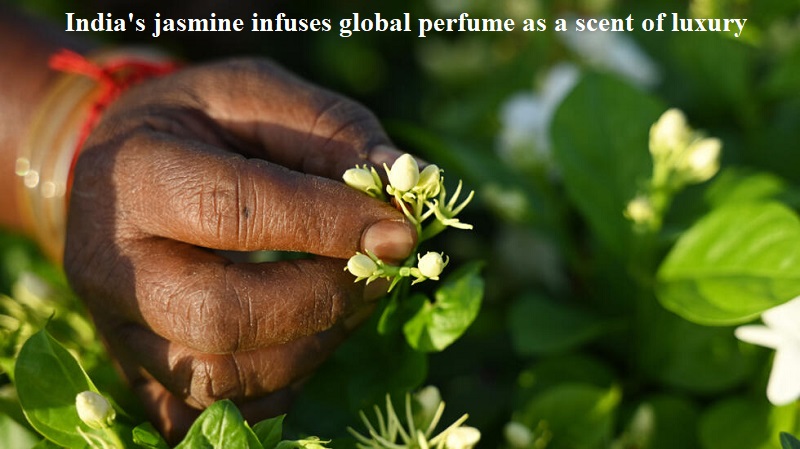
Aromatic fragrances permeate the atmosphere as skilled harvesters in India meticulously pluck white jasmine blossoms just before their buds unfurl, a crucial step in producing a prized ingredient for perfumes worldwide.
Jasmine’s potent scent is released exclusively at night when it blooms, compelling pickers to select only the buds that have yet to fully open.
“We know which one to pick,” remarked Malarkodi, who provided only her first name, deftly snapping her fingers to delicately gather the buds, while tucking fully bloomed flowers into her hair. “These are not useful… but I love their fragrance,” she mused.
For millennia, jasmine’s fragrant blossoms have been used in India to pay homage to deities, and its aroma plays a pivotal role in renowned perfumes across the globe.
In the ancient city of Madurai in southern India, jasmine is omnipresent, attracting purchasers from some of the world’s most famous fragrance brands like Dior’s J’adore and Guerlain’s Mon Guerlain.
Raja Palaniswamy, a director at Jasmine Concrete, explained that jasmine oil is among the world’s most expensive, and his company extracts a few precious drops of this delightful essence from vast quantities of jasmine.
The women harvesting the buds earn approximately $1.50 per day for collecting around four to five kilograms, with each kilogram comprising roughly 4,000 buds.
Once harvested, the jasmine is quickly brought to market, with prices ranging from 200 to 2,000 rupees ($2.40-$24) per kilogram on special occasions.
The jasmine variety found in Madurai, scientifically known as Jasminum sambac, was granted a “geographical indication” label by the World Intellectual Property Organization in 2013 due to its “intense fragrance.”
Thierry Wasser, the perfumer and “nose” at Guerlain, described the Madurai jasmine as “lush, rich, and vibrant.” Wasser procures jasmine oil from Palaniswamy’s company and noted its smoothness and unchanging floral quality.
Beyond Guerlain, Palaniswamy shared that his company supplies jasmine oil to other brands like Bulgari, Dior, and Lush.
In Madurai, the radiant white jasmine flowers adorn residents’ homes, and women secure strings of them in their hair. These flowers are also found in the sprawling 14th-century complex of the Hindu goddess Meenakshi, revered as the guardian of the city.
Meenakshi is depicted holding a parrot, a symbol of love. Each night, individuals surround a shrine adorned with fragrant jasmine flowers as the goddess retires with her husband Shiva in a symbolic ceremony.
Wasser declared, “When you realize that this flower celebrates love, brotherhood, family, and friendship; when you smell it, it takes on another dimension… To me, this flower embodies love. Period.”
However, the process of extracting jasmine oil requires extensive labor. The women who gather the jasmine, whether for deity worship, weddings, funerals, or luxury perfumes, don’t have the luxury to indulge in its allure.
In a jasmine field near the ancient city, women gently manipulate the bush’s branches in search of perfect buds. The processing factory operates ceaselessly during harvest season, with workers collecting newly plucked flowers and waiting for the oblong buds to unfold.
“As soon as it starts blooming, it releases its fragrance,” Palaniswamy explained.
Late at night, as the intoxicating aroma of jasmine fills the air, workers gather the blooms and load them into extractors. These freshly collected jasmine blossoms are soaked in a solvent to absorb the aromatic molecules, yielding a waxy substance known as concrete.
This concrete undergoes further processing with alcohol to meticulously remove the waxes, resulting in a concentrated essence known as absolute. This absolute becomes a crucial ingredient in perfumes.
Around 700 kilograms of fresh jasmine yield only one kilogram of oil, valued at approximately $4,200, according to Palaniswamy.
Nonetheless, Amsavalli Karuppuswamy, who runs a stall outside the flower market where she crafts garlands from flowers, emphasized that the original jasmine flowers will always surpass any oil. She declared, “I’ll continue this work until I die… women love jasmine, that’s why we do this… The scents can’t compare to the genuine jasmine flowers—nothing matches the authentic fragrance of jasmine.”

Post Your Comments